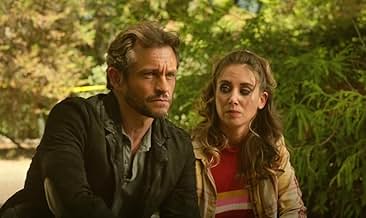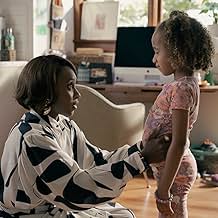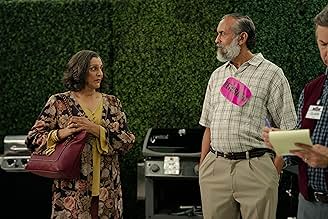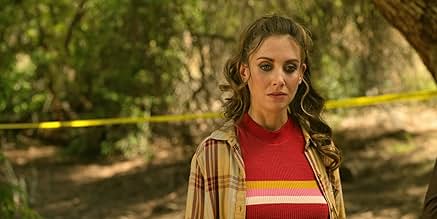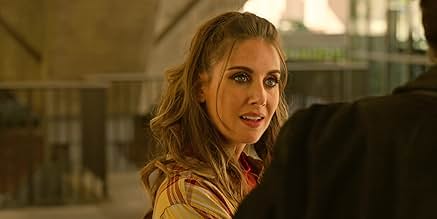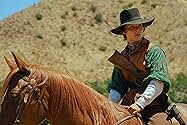Com um elenco estelar, esta série antológica tece oito contos feministas sombriamente cômicos que tomam abordagens inesperadas para assuntos como papéis de gênero, autonomia e identidade.Com um elenco estelar, esta série antológica tece oito contos feministas sombriamente cômicos que tomam abordagens inesperadas para assuntos como papéis de gênero, autonomia e identidade.Com um elenco estelar, esta série antológica tece oito contos feministas sombriamente cômicos que tomam abordagens inesperadas para assuntos como papéis de gênero, autonomia e identidade.
- Prêmios
- 1 indicação no total
Explorar episódios
Avaliações em destaque
You have to tune in just to see Nicole Kidman and Judy Davis going head-to-head, but there's a lot more to enjoy in this poignant yet whimsical anthology series from GLOW creators Liz Flahive and Carly Mensch.
The series is based on a collection of short stories by Irish writer Cecelia Ahern, and each of the eight half-hour episodes brings its own splash of magical realism or Black Mirror-style sci-fi as it illuminates a different facet of female experience. Common themes wend throughout, but the tone of each individual episode is different.
There's a layered melancholy to Kidman's and Davis's episode, The Woman Who Ate Photographs, which is made all the more resonant by the nostalgic ordinariness of its Australian setting. Kidman plays a woman nearing the end of her tether as she sets off in a moving van to bring her Alzheimer's-afflicted mother (Davis) to live with her and her husband and son (Simon Baker and Kai Lewins), who aren't giving her quite the support that she needs.
It's fun to see Kidman slapping the steering wheel while singing along to Midnight Oil and Dexys Midnight Runners, but Australian director Kim Gehrig, who has made music videos for Chaka Khan and Brittany Howard, among others, extracts a real ache from the NSW scenery, not least the rural brick veneer in which Davis' character has been rattling around on her own.
Davis, who was so devastatingly brilliant recently in Nitram (Stan), produces another emotionally piercing performance as a woman who is by turns hostile, vulnerable, disapprovingly distant, mischievous and scared. The gulf between mother and daughter yawns like the Burragorang Valley in what is a memorable little piece of work.
GLOW fans, meanwhile, will particularly enjoy other episodes involving Alison Brie as a ghost investigating her own murder, and Betty Gilpin as a woman whose husband keeps her, quite literally, on a shelf - at least until she busts out into an old-timey dance number, whirling through a thoroughly modern and thoroughly bemused Los Angeles.
Issa Rae (Insecure) delivers a particularly strong performance in what is paradoxically one of the series' weaker episodes, about a successful black writer feeling increasingly invisible to the white showbiz world that's courting her; and Merritt Wever is typically amazing as a woman whose dead-end dating life takes a strange turn when she meets a charming male-feminist duck.
Streaming services are glutted with anthology series, but we still needed this one. Truthful, validating and sometimes just plain magical.
The series is based on a collection of short stories by Irish writer Cecelia Ahern, and each of the eight half-hour episodes brings its own splash of magical realism or Black Mirror-style sci-fi as it illuminates a different facet of female experience. Common themes wend throughout, but the tone of each individual episode is different.
There's a layered melancholy to Kidman's and Davis's episode, The Woman Who Ate Photographs, which is made all the more resonant by the nostalgic ordinariness of its Australian setting. Kidman plays a woman nearing the end of her tether as she sets off in a moving van to bring her Alzheimer's-afflicted mother (Davis) to live with her and her husband and son (Simon Baker and Kai Lewins), who aren't giving her quite the support that she needs.
It's fun to see Kidman slapping the steering wheel while singing along to Midnight Oil and Dexys Midnight Runners, but Australian director Kim Gehrig, who has made music videos for Chaka Khan and Brittany Howard, among others, extracts a real ache from the NSW scenery, not least the rural brick veneer in which Davis' character has been rattling around on her own.
Davis, who was so devastatingly brilliant recently in Nitram (Stan), produces another emotionally piercing performance as a woman who is by turns hostile, vulnerable, disapprovingly distant, mischievous and scared. The gulf between mother and daughter yawns like the Burragorang Valley in what is a memorable little piece of work.
GLOW fans, meanwhile, will particularly enjoy other episodes involving Alison Brie as a ghost investigating her own murder, and Betty Gilpin as a woman whose husband keeps her, quite literally, on a shelf - at least until she busts out into an old-timey dance number, whirling through a thoroughly modern and thoroughly bemused Los Angeles.
Issa Rae (Insecure) delivers a particularly strong performance in what is paradoxically one of the series' weaker episodes, about a successful black writer feeling increasingly invisible to the white showbiz world that's courting her; and Merritt Wever is typically amazing as a woman whose dead-end dating life takes a strange turn when she meets a charming male-feminist duck.
Streaming services are glutted with anthology series, but we still needed this one. Truthful, validating and sometimes just plain magical.
The frustrating thing about these magical realism, Twilight Zone-ish tales, is that they start out intriguing, draw you in, and nearly every one of them ends with an anticlimactic thud.
They are all well-acted and handsomely produced, but speaking of The Twilight Zone, the ending of each of those was the best part!
If the stories these are based on didn't pay off at the end, then the clearly talented writers should have fixed that.
They are all well-acted and handsomely produced, but speaking of The Twilight Zone, the ending of each of those was the best part!
If the stories these are based on didn't pay off at the end, then the clearly talented writers should have fixed that.
I was expecting more from this series. The stories felt a bit off, some confusing and like the writers couldn't think of a coherent ending so they just left it like that. Had some good actors, some funny moments, some horrific moments and over all, a lot of sadness. That's all I got from this. Like I said, underwhelmed.
Some of the reviews left for this series demonstrate WHY shows like this are made in the first place. An attempt to educate and share the female perspective, that is then lost on those who find it difficult to empathise with another persons' experience.
The series improves with each episode, IMO. The first episode could've packed much more punch as it was flat narratively speaking. The penultimate episode where a woman solved her own murder was movie potential, and the last was a beautiful story of "the grass is always greener when you take things for granted".
It's not the BEST thing ever made for TV. However it is quirky; deep yet whimsical, serious yet silly. Watch it as mindless time wasting OR mentally churn over the meaning behind it: it really is your choice as a viewer. You will get more enjoyment from it if you like analysing allegories and applying it to your own interpretation. Not everyone does, and that's okay: but this series will likely frustrate you.
It's odd. And familiar as a female. Watch it in short digestible 30min chunk episodes if needed.
The series improves with each episode, IMO. The first episode could've packed much more punch as it was flat narratively speaking. The penultimate episode where a woman solved her own murder was movie potential, and the last was a beautiful story of "the grass is always greener when you take things for granted".
It's not the BEST thing ever made for TV. However it is quirky; deep yet whimsical, serious yet silly. Watch it as mindless time wasting OR mentally churn over the meaning behind it: it really is your choice as a viewer. You will get more enjoyment from it if you like analysing allegories and applying it to your own interpretation. Not everyone does, and that's okay: but this series will likely frustrate you.
It's odd. And familiar as a female. Watch it in short digestible 30min chunk episodes if needed.
I didn't realize this was based on the book of stories by Cecelia Ahern, which I own but haven't read yet. On the surface, these stories are abstract, absurd, and likely not for everyone. But if you understand the metaphors (abusive relationships, trophy wives, etc.), this is a well-done, well-written anthology.
Você sabia?
- CuriosidadesThe title is a reference to the feminist anthem, "I Am Woman, Hear Me Roar" by Helen Reddy.
Principais escolhas
Faça login para avaliar e ver a lista de recomendações personalizadas
Detalhes
Contribua para esta página
Sugerir uma alteração ou adicionar conteúdo ausente

![Assistir a Trailer Season 1 [OV]](https://m.media-amazon.com/images/M/MV5BMjdhZDI4NWEtMGY1OC00ZWI2LThkMWQtMjAwNjUwOTkyMWRmXkEyXkFqcGdeQXRyYW5zY29kZS13b3JrZmxvdw@@._V1_QL75_UX500_CR0)
